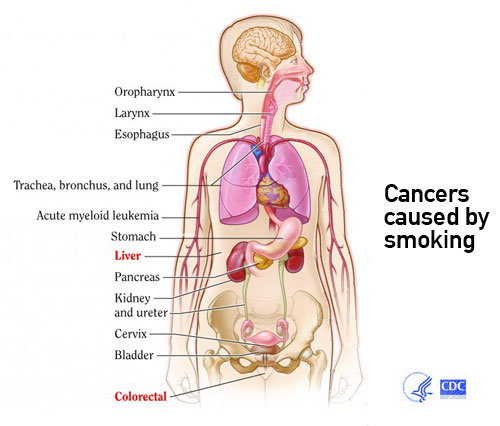
Switching from smoking to vaping dramatically reduces cancer risk
Posted on September 25, 2023 By Colin
SMOKING IS THE LEADING PREVENTABLE CAUSE OF CANCER. There is now compelling evidence that switching to vaping can substantially reduce the risk of cancer.

Smoking causes at least 15 known cancers
Carcinogen levels much lower from vaping
Cigarette smoke is deadly and contains at least 69 known carcinogens (cancer-causing chemicals), many in high doses. The main carcinogens in smoke are listed in the APPENDIX at the bottom of this page.
Most carcinogens are broken down to other chemicals in the body, known as 'biomarkers'. The dose or level of a biomarker is what determines its cancer risk. This is the key principle of 'the dose makes the poison'.
By comparing the levels of cancer biomarkers from smoking and vaping we can compare the cancer risk from smoking versus vaping.
Most of the cancer biomarkers in smokers are not found in people who vape. Those that are present are at substantially reduced doses, mostly below the level of harm
This has been confirmed in numerous research studies and reviews e.g., Holt 2023; Scherer 2022; Scherer 2022; Anic 2022; Taylor 2023; Soulet 2022; Hartmann-Boyce 2022; Smith 2020; Xia 2020; Goniewicz 2018; Dai 2022; Shahab 2017; Office of Health Improvement and Disparities 2022; Shiffman 2023.
The two most potent carcinogens from smoking are TSNs and PAHs. Both are at very low or non-existent levels in vapour.
- PAHs are mostly produced from incomplete combustion (burning) of organic materials. There is no combustion in vaping.
- TSNs are specifically to tobacco and are mainly produced in the curing process for tobacco leaves and there is no tobacco in vapes. Rarely, trace amounts are detected as contaminants in e-liquids.
The risks from aldehydes (e.g., formaldehyde) and metals are often exaggerated in the media.
- Aldehydes are produced at minimal levels under normal vaping conditions. Higher levels are only generated when devices are overheated in unrealistic laboratory conditions.
- Heavy metals. Under normal vaping conditions, metals in people who vape are below the levels known to cause harm. Metals are also not of concern to bystanders.
Studies estimate a dramatic reduction in cancer risk
The precise reduction in cancer risk from switching to vaping will not be known for another 20-30 years when long term epidemiological studies are available. In the meanwhile, it is common scientific practice to do modelling studies to forecast or estimate future outcomes using what we currently know. For example, modelling is used to predict climate change.
Estimates are based on identifying the dose of cancer biomarkers and their cancer-causing potency.
All modelling studies predict that the risk of cancer from vaping will be substantially less than from smoking
- Stephens estimated that the lifetime risk of cancer from vaping is 0.4% of the risk from smoking
- Murkett estimated that the lifetime risk of cancer from vaping is 0.23% of the risk from smoking
- Rodrigo estimated that the lifetime cancer risk from vaping a closed vape system is 0.9-1.4% that of smoking
- Scungio estimated that the lifetime lung cancer risk from vaping is 50,000 times less than from smoking
- Avino estimated that the lifetime lung cancer risk from second-hand vapour is 50,000 times less than from second-hand smoke
Everything has some risk
Expecting zero risk is unrealistic. There are risks associated with everything we do.
For example, an analysis of 53 studies found that for each alcoholic drink consumed per day, breast cancer risk increased by about seven percent. Women who had two to three alcoholic drinks per day had a 20 percent higher risk of breast cancer compared to non-drinkers.
There are 21 carcinogens in roasted coffee including benzene and formaldehyde . However, billions of people happily have a cup or more of coffee each day.
Statements by expert bodies
Leading UK cancer charity Cancer Research UK states
There is no good evidence that vaping causes cancer
A review by 15 past Presidents of the prestigious Society for Research on Nicotine and Tobacco concluded, "There is little evidence that e-cigarettes pose significant cancer risk."
Advice for smokers
For smokers who are unable or unwilling to quit, switching completely to vaping will reduce your exposure to carcinogens and substantially lower your risk of developing cancer.
The evidence is now crystal clear. Advice to the contrary from Australian health authorities and Cancer Councils is irresponsible, is not evidence-based and should be ignored

Don't be misled. If you are a smoker, switching to vaping could save your life.
APPENDIX
Carcinogens in tobacco smoke
Cigarette smoke is deadly and contains at least 69 carcinogens (cancer-causing chemicals), many in high doses. The main carcinogens in smoke are
- Polycyclic aromatic hydrocarbons (PAHs)
- Tobacco specific nitrosamines (TSNs e.g., NNK and NNN)
- Aromatic amines (e.g., 4-aminobyphenyl)
- Volatile organic compounds (e.g., 1,3-butadiene and benzene)
- Aldehydes (formaldehyde, acetaldehyde and acetoin)
- Metals (Arsenic, beryllium, nickel, chromium, cadmium and polonium-210)
It is important to note that nicotine does not cause cancer.
Sources: US Surgeon General 2010; International Agency for Research on Cancer